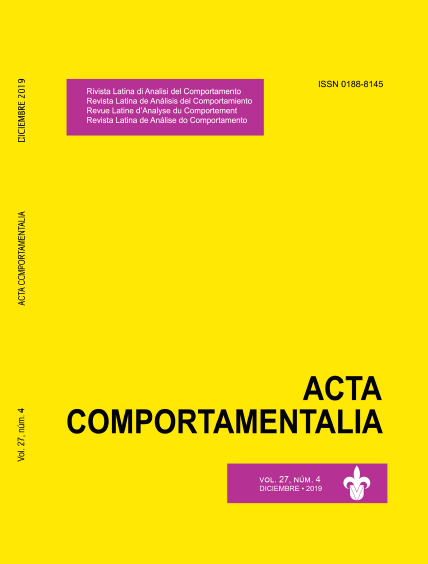Usos do termo emoção na obra de B. F. Skinner
DOI:
https://doi.org/10.32870/ac.v27i4.72027Palabras clave:
emotion, Radical Behaviorism, Skinner, emotional state, psychologyResumen
Although emotions are considered relevant phenomena in diverse psychologies, the concepts used in the psychological literature are divergent because they are approached by different authors in different philosophical contexts. However, Radical Behaviorism is often accused of neglecting emotions. The objective of this article was to evaluate the pertinence of these criticism. For this propose, the uses of the term emotion in Skinner’s work were searched and systematized. It was a theoretical-conceptual research carried out in three stages. The first stage consisted in selecting texts in which Skinner employed the term “emotion”, as well as similar words or expressions, such as: “emotional”, “emotive”, and so on. To do so, a search for these terms was performed using the computer’s Ctrl + F command in Skinner’s books in pdf format. The search was made from the radical “emot”. The second stage was a comparison of the uses of the term “emotion” selected in from the previous stage, in order to evaluate the continuity or rupture in Skinnerian’s treatment of the subject. Thereby, each of the identified terms and their respective sections were cut out and transcribed into tables in order to facilitate comparison. The tables contained four columns: the keyword, the section in which it appears, an interpretative comment, and the categorization according to the conver- gences found. In the third stage it was performed a categorization of the meanings of the term “emotion” found in Skinner’s work. This classification was made in the last column of the table described in the previous step. The uses of the terms and the elaboration of the categories attest that Skinner discuss emotions practically from the beginning to the end of his work. The convergences of the terms related to emotions allow to delineate a Skinnerian theory of emotions, which remains the same, even with the adoption of the operant model. In this theory, emotion is defined as an immediate and temporary change in the strength of behaviors that composes a behavioral repertoire. In this emotional state, while certain responses have a high probability of occurrence, other responses have a low probability. The only difference promoted by the operant model is that with its adoption, Skinner begins to consider that in an emotional state both reflex and operant responses occur. The occurrences of the emotional terms throughout the work contradict, therefore, the criticisms traditionally directed to the Skinnerian theory in which it ignores the importance of emotions. The difficulty in understanding the notion of state seems to be one of the reasons why Skinner’s theory of emotions is still little discussed, even in behavioral literature. The comprehension of Skinner’s theory of emotions seems to depend directly on the interpretation of the philosophical commitments of Radical Behaviorism.
Descargas
Descargas
Publicado
Cómo citar
Número
Sección
Licencia

<a rel="license" href="http://creativecommons.org/licenses/by-nc-sa/4.0/"><img alt="Licencia de Creative Commons" style="border-width:0" src="https://i.creativecommons.org/l/by-nc-sa/4.0/88x31.png" /></a><br />Este obra está bajo una <a rel="license" href="http://creativecommons.org/licenses/by-nc-sa/4.0/">licencia de Creative Commons Reconocimiento-NoComercial-CompartirIgual 4.0 Internacional</a>.






